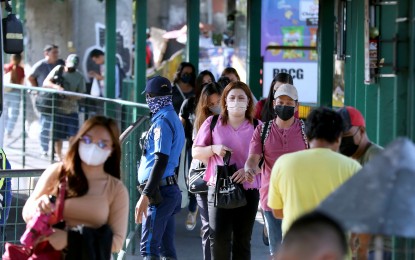
PROTECTION. Three years into the pandemic, Filipino commuters at the EDSA Bus Carousel in Nepa Q-Mart station in Cubao, Quezon City still wear their face masks as protection against Covid-19 and other diseases on March 29, 2023. In a recent Social Weather Stations survey, the majority, or 91 percent, of adult Filipinos interviewed agree with the voluntary wearing of face masks. (PNA photo by Joey O. Razon)
MANILA – The sudden uptick in cases of respiratory illnesses or respiratory influenza-like illness (ILI) was due to the stronger monitoring and surveillance of the government in the health sector after the coronavirus disease 2019 (Covid-19) pandemic, according to the Department of Health (DOH).
DOH Assistant Secretary for Public Health Services Mylene Beltran, during a public inquiry by the Senate Committee on Health and Demography, said on Monday this surge of cases is similar to the trends that the Department has recorded in similar previous periods, globally.
"Any ILI case is now being monitored compared to then na Covid-19 lang po ang ating minomonitor (that only Covid-19 cases were being monitored)," Beltran told the panel noting that so far no local government unit has declared an outbreak.
Further, Beltran cited the lifting of health restrictions and the population crowding and being more mobile as reasons.
"We have already set in place mechanisms and systems to be able to be more prepared and we've learned lessons from the Covid-19 experience," she assured.
Although it is currently voluntary, Beltran said DOH encourages everyone to wear face masks.
ILI, she said, covers those suffering from fever or experiencing respiratory signs or symptoms like sore throat or cough.
DOH Epidemiology Bureau Chief Dr. Alethea de Guzman said influenza, Covid-19, or even the walking pneumonia almost have the same symptoms.
"Ang pamamaraan para malaman kung alin po dun sa mga yun ay kapag nakuhanan po tayo ng sample. Yun pong throat swab or [oropharyngeal swabs] OPS and [nasopharyngeal swabs] NPS na tinatawag natin (The way to determine is to give a sample. Throat swab or we call the [oropharyngeal swabs] OPS and [nasopharyngeal swabs] NPS)," de Guzman said.
She urged young ones, elders, and those who have comorbidities experiencing ILI symptoms to be tested in hospitals or at the Research Institute for Tropical Medicine.
Dr. Razel Nikka Hao, chief of DOH's Disease Prevention and Control Bureau, emphasized the importance of observing minimum public health standards like cough and other respiratory etiquette.
Hao also noted that aside from flu and pneumonia, the DOH has been providing influenza and pneumococcal vaccines, especially for indigent elderlies.
"This year, we were able to distribute these across the regions by August and every year yan na binibili at ipinamimigay ng (it is being procured and being distributed by the) Department of Health. So, rest assured next year, we are actually expanding that it's not just anymore the indigent but other adults with comorbidities will be able to use the pneumococcal and influenza vaccines," she said.
The panel being chaired by Senator Christopher Lawrence “Bong” Go conducted an inquiry into the matter in response to the resolution filed by Senate Majority Leader Joel Villanueva to look into the preparedness of the government on the reported global rise of respiratory illnesses.
"Covid-19 pandemic highlighted the need for us to always prioritize the resilience of our communities and our health systems on which they depend. We learned a lot from the pandemic and we pushed to strengthen our healthcare systems so that we could always be prepared for whatever health emergency may come,” Go said.
According to Go, the Chinese National Health Commission reported an increase in the incidence of respiratory diseases last month.
He said Europe and North America likewise reported an increase in respiratory incidence. (PNA)
